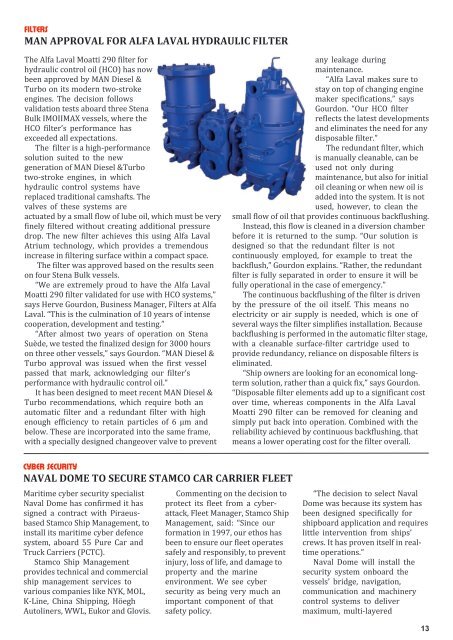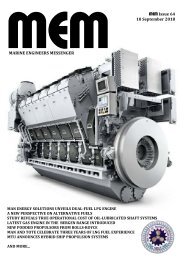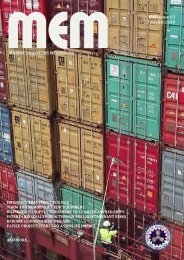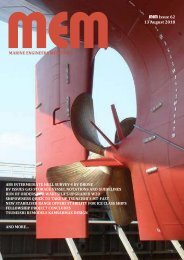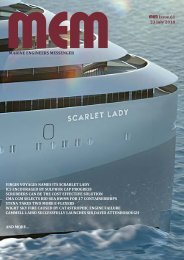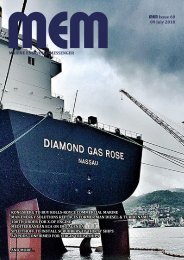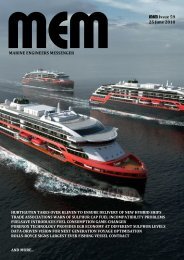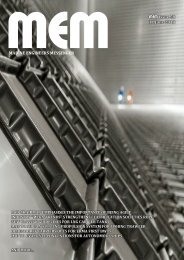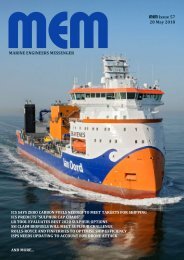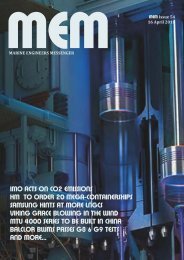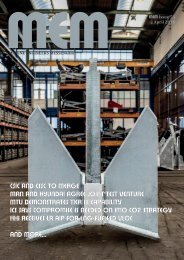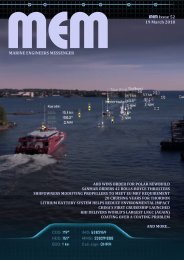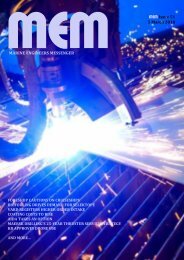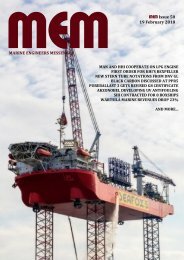Create successful ePaper yourself
Turn your PDF publications into a flip-book with our unique Google optimized e-Paper software.
FILTERS<br />
MAN APPROVAL FOR ALFA LAVAL HYDRAULIC FILTER<br />
The Alfa Laval Moatti 290 filter for<br />
hydraulic control oil (HCO) has now<br />
been approved by MAN Diesel &<br />
Turbo on its modern two-stroke<br />
engines. The decision follows<br />
validation tests aboard three Stena<br />
Bulk IMOIIMAX vessels, where the<br />
HCO filter’s performance has<br />
exceeded all expectations.<br />
The filter is a high-performance<br />
solution suited to the new<br />
generation of MAN Diesel &Turbo<br />
two-stroke engines, in which<br />
hydraulic control systems have<br />
replaced traditional camshafts. The<br />
valves of these systems are<br />
actuated by a small flow of lube oil, which must be very<br />
finely filtered without creating additional pressure<br />
drop. The new filter achieves this using Alfa Laval<br />
Atrium technology, which provides a tremendous<br />
increase in filtering surface within a compact space.<br />
The filter was approved based on the results seen<br />
on four Stena Bulk vessels.<br />
“We are extremely proud to have the Alfa Laval<br />
Moatti 290 filter validated for use with HCO systems,”<br />
says Herve Gourdon, Business Manager, Filters at Alfa<br />
Laval. “This is the culmination of 10 years of intense<br />
cooperation, development and testing.”<br />
“After almost two years of operation on Stena<br />
Suède, we tested the finalized design for 3000 hours<br />
on three other vessels,” says Gourdon. “MAN Diesel &<br />
Turbo approval was issued when the first vessel<br />
passed that mark, acknowledging our filter’s<br />
performance with hydraulic control oil.”<br />
It has been designed to meet recent MAN Diesel &<br />
Turbo recommendations, which require both an<br />
automatic filter and a redundant filter with high<br />
enough efficiency to retain particles of 6 µm and<br />
below. These are incorporated into the same frame,<br />
with a specially designed changeover valve to prevent<br />
any leakage during<br />
maintenance.<br />
“Alfa Laval makes sure to<br />
stay on top of changing engine<br />
maker specifications,” says<br />
Gourdon. “Our HCO filter<br />
reflects the latest developments<br />
and eliminates the need for any<br />
disposable filter.”<br />
The redundant filter, which<br />
is manually cleanable, can be<br />
used not only during<br />
maintenance, but also for initial<br />
oil cleaning or when new oil is<br />
added into the system. It is not<br />
used, however, to clean the<br />
small flow of oil that provides continuous backflushing.<br />
Instead, this flow is cleaned in a diversion chamber<br />
before it is returned to the sump. “Our solution is<br />
designed so that the redundant filter is not<br />
continuously employed, for example to treat the<br />
backflush,” Gourdon explains. “Rather, the redundant<br />
filter is fully separated in order to ensure it will be<br />
fully operational in the case of emergency.”<br />
The continuous backflushing of the filter is driven<br />
by the pressure of the oil itself. This means no<br />
electricity or air supply is needed, which is one of<br />
several ways the filter simplifies installation. Because<br />
backflushing is performed in the automatic filter stage,<br />
with a cleanable surface-filter cartridge used to<br />
provide redundancy, reliance on disposable filters is<br />
eliminated.<br />
“Ship owners are looking for an economical longterm<br />
solution, rather than a quick fix,” says Gourdon.<br />
“Disposable filter elements add up to a significant cost<br />
over time, whereas components in the Alfa Laval<br />
Moatti 290 filter can be removed for cleaning and<br />
simply put back into operation. Combined with the<br />
reliability achieved by continuous backflushing, that<br />
means a lower operating cost for the filter overall.<br />
CYBER SECURITY<br />
NAVAL DOME TO SECURE STAMCO CAR CARRIER FLEET<br />
Maritime cyber security specialist<br />
Naval Dome has confirmed it has<br />
signed a contract with Piraeusbased<br />
Stamco Ship Management, to<br />
install its maritime cyber defence<br />
system, aboard 55 Pure Car and<br />
Truck Carriers (PCTC).<br />
Stamco Ship Management<br />
provides technical and commercial<br />
ship management services to<br />
various companies like NYK, MOL,<br />
K-Line, China Shipping, Höegh<br />
Autoliners, WWL, Eukor and Glovis.<br />
Commenting on the decision to<br />
protect its fleet from a cyberattack,<br />
Fleet Manager, Stamco Ship<br />
Management, said: “Since our<br />
formation in 1997, our ethos has<br />
been to ensure our fleet operates<br />
safely and responsibly, to prevent<br />
injury, loss of life, and damage to<br />
property and the marine<br />
environment. We see cyber<br />
security as being very much an<br />
important component of that<br />
safety policy.<br />
“The decision to select Naval<br />
Dome was because its system has<br />
been designed specifically for<br />
shipboard application and requires<br />
little intervention from ships’<br />
crews. It has proven itself in realtime<br />
operations.”<br />
Naval Dome will install the<br />
security system onboard the<br />
vessels’ bridge, navigation,<br />
communication and machinery<br />
control systems to deliver<br />
maximum, multi-layered<br />
13


